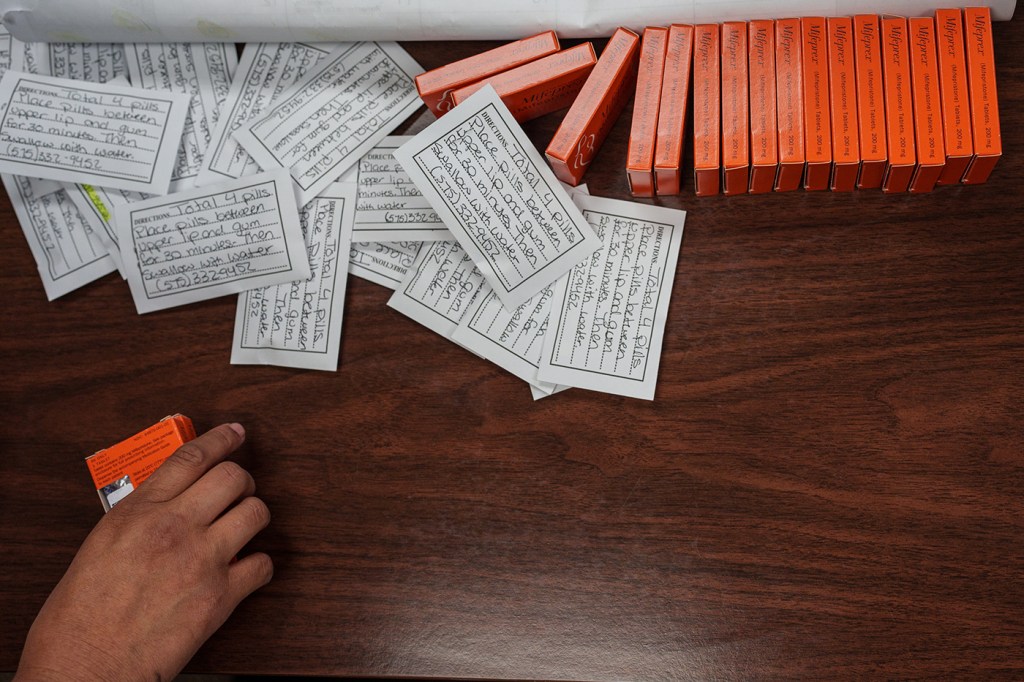Should Biden ignore a Texas judge’s ruling on the abortion pill?

A federal judge in Texas ruled to reverse the Food and Drug Administration’s decades long approval of mifepristone—a pill used in abortions and to manage miscarriages—in what Northeastern legal experts describe as yet another instance of “norm-shattering” by a highly politicized judiciary.
The decision was made by U.S. District Judge Matthew Kacsmaryk, a Trump-appointed judge in Texas. An hour later, U.S. District Judge Thomas Rice, an Obama-appointed judge in Washington state, issued a separate ruling prohibiting the FDA from pulling the drug.
The conflicting decisions now leave the Biden administration and the federal agency in limbo.
Some Democratic lawmakers have urged President Joe Biden to simply ignore Kacsmaryk’s finding, arguing that the FDA has the authority to do so, while highlighting the “devastating” consequences of restricting access to one of the most common methods of abortion. On Monday, the Justice Department appealed the Texas decision on the ground that it was brought by challengers who were not personally harmed by the drug.

It remains to be seen if the appellate court will grant the government a request to put Kacsmaryk’s decision, which would take effect this week, on hold. But, in an already deeply divided nation, what would be the consequences of disregarding the ruling?
“There’s a bind here,” says Wendy Parmet, professor at the Northeastern University School of Law. “Here’s the problem. Somebody’s shattering a norm. Then the question is, what do you do back?”
The question strikes at the heart of a political divide roiling the nation, which watched the Supreme Court last year do away with decades of precedent when it overturned Roe v. Wade, ending the constitutional right to abortion. When the high court issued its ruling, Northeastern experts highlighted how the decision was way out of step with popular opinion—a situation they say is linked to an increasing number of ideological judicial appointments under former President Donald Trump.
“This is an ideologically driven decision that does not reflect the sound judgment that the public has the right to expect from a jurist with a life appointment,” says Martha F. Davis, university distinguished professor of law at Northeastern, who teaches constitutional law and human-rights advocacy. “The tell is the fact that the judge granted a preliminary injunction to bar use of a drug that has been on the market for more than twenty years, with a proven record of safety.”
“The judge’s conclusion that there would be ‘irreparable harm’ in keeping mifepristone on the market pending a trial in the case would be laughable if the impact were not so serious,” Davis adds.
Parmet says Kacsmaryk’s ruling is problematic, not only because it would mean “serious health consequences” for people looking to obtain an abortion or miscarriage management, but because it dispenses with long-held doctrines and norms that form the foundation of judicial decision-making.
Among the norms and principles Kacsmaryk brushed aside when he issued his decision: his “extraordinarily broad reading” of standing, and his “extraordinarily narrow reading” of the exhaustion doctrine and agency deference—all norms doctrines to rein in the courts, Parmet says.
Parmet says the “bigger and bolder” decisions coming out of certain Republican-led jurisdictions are, in a way, reflections of the extreme political divide.
“I think one way to understand this is to recognize the way the increasing political polarization of the country is now reflected in the judiciary and geographically,” Parmet says. “What you’re seeing now is that it’s becoming more extreme, and so you get this situation where, in certain jurisdictions, the law is getting very different, meaning the probability of outcomes are becoming quite dramatically different between states.”
Parmet cautions against the impulse to play hardball amid calls in the legal community for Biden and the FDA to adopt a position of nonacquiescence, or refuse to comply with the ruling. Such tit-for-tat, she says, further erodes trust in the judiciary by emboldening judges to continue to violate norms.
But compliance may not be the answer either, she says.
“If you play softball, you, in a sense, enable the hardball player—and they score a victory, and then they get the message that norm-busting works,” Parmet says. “If you bust norms back, if you’re in the position that you believe in the rule of law and democracy, and you want the peaceful resolution of disputes, you’re actually accelerating the erosion of the norms.”
Parmet says there’s no easy way forward for the FDA, Biden or drugmakers who worry about the implications of ignoring “decades of scientific evidence and legal precedent,” some 250 pharmaceutical and biotech companies wrote in a joint statement on Monday.
“We’re just in this terrible moment where, to be clear, neither side trusts the good faith or comity of the other side,” Parmet says.
Davis says the root of the problem is that less qualified judges have made it to the federal bench in recent years.
“The route to obtaining a life tenure appointment as a federal judge is arduous,” Davis says. “In recent years, and particularly during the Trump Administration, non-partisan ratings of the American Bar Association have too often taken a back seat to ideology. This is the result.”
The dueling injunctions will likely place the issue before the U.S. Supreme Court, Parmet says.
Tanner Stening is a Northeastern Global News reporter. Email him at t.stening@northeastern.edu. Follow him on Twitter @tstening90.





